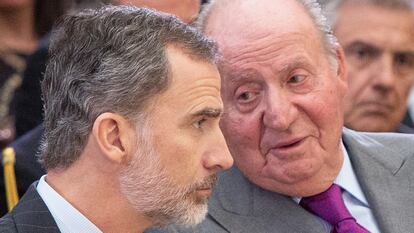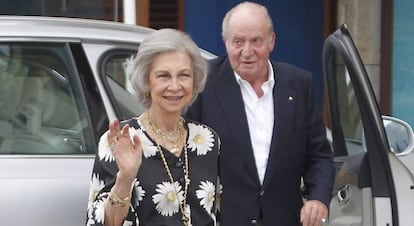How the departure of Spain’s former king was planned
After talks between intermediaries stalled, Juan Carlos and his son, the reigning Felipe VI, met face to face to deal with the fallout from a financial scandal

The departure from Spain of former king Juan Carlos I was decided at a face-to-face meeting between himself and his son, the reigning Felipe VI.
On Monday it emerged that Juan Carlos, who reigned for nearly 40 years and guided the country through a peaceful transition to democracy following the death of dictator Francisco Franco, had left Spain for an unknown destination.
In a letter released by the royal household, Juan Carlos said he was leaving due to the “public impact” on the Crown’s reputation of Swiss and Spanish investigations into alleged financial irregularities involving the former monarch.
The Spanish government was aware of the conversations, but the final decision was in the hands of Felipe VI
The one-on-one meeting took place after attempts at reaching an agreement through intermediaries failed. The contacts were aimed at finding the best way to prevent the scandal over Juan Carlos’ undeclared accounts from damaging the Spanish monarchy.
The Spanish government was aware of the conversations, but the final decision was in the hands of Felipe VI, as noted on Tuesday by Prime Minister Pedro Sánchez, of the Socialist Party (PSOE), who heads a minority government in partnership with the leftist Unidas Podemos. Juan Carlos’ departure has become a divisive issue within the governing coalition.
On Sunday, the former king left the royal residence, La Zarzuela – his home for the last 58 years – and headed for the Galician town of Sanxenxo, where he spent the night at the home of his friend Pedro Campos.

The following morning he crossed the border into Portugal, a country where he spent a year as a child. Despite some media reports that Juan Carlos boarded a plane in Porto headed for Dominican Republic, several sources have confirmed to EL PAÍS that the emeritus king did not in fact fly to that Caribbean destination.
The decision was reached after weeks of reflection, following a series of three-way talks between representatives of the royal household, of Juan Carlos I, and of the prime minister’s office. At these talks, all possible alternatives were analyzed in a bid to find the one that would minimize the damage to the monarchy caused by ongoing investigations by Swiss and Spanish prosecutors into the former king’s opaque bank accounts.
In the end, it took a personal meeting between father and son to get the stalled talks back on track. As one source familiar with the matter described it: “There were no good solutions, just less bad ones.”
For Juan Carlos I, his red line was preserving his honorary title of emeritus king, which was bestowed upon him in June 2014, a few days before abdicating the throne. For Felipe VI, the goal was to get his father to voluntarily accept a solution, instead of having to impose one on him.
There were no good solutions, just less bad ones”Source familiar with the talks
Juan Carlos I, said the same sources, was eager to restore his public image, which has been seriously damaged by news of his relationship with the German businesswoman Corinna Larsen, and he even offered to give up his constitutionally-granted inviolability. But this option was considered legally non-viable.
Another option under consideration was to settle his tax dues, even beyond the five years set by the law as the statute of limitations on tax crimes. Sources consulted by this newspaper said that the problem was that this would force Juan Carlos I to pay over €60 million, if a multi-million donation by the late Saudi king Abdullah was included in his taxable income. And that was beyond the former king’s current ability to pay. Not to mention the fact that even then, there was no guarantee that Corinna Larsen might not accuse him of concealing real estate property under the name of third parties, as she has suggested in the past.
Ultimately, father and son agreed that Juan Carlos I would abandon Spain altogether. Knowledgeable sources said that the next move was deciding what country the former king would move to, and how he would support himself there. In March, Felipe VI stripped his father of his annual stipend of nearly €200,000, forcing the latter to start using his savings and to rely on the generosity of his friends, said sources familiar with the situation, adding that occasionally this generosity was not as splendid as might have been expected.
First stop, Portugal
Choosing his new country of residence was no easy matter, and advisors had to rule out several of the former king’s favorite places. Juan Carlos I finally left for Portugal, although this does not necessarily mean that he will be settling down there, said the same sources.
As for the best way to break the news to Spanish public opinion, it was agreed that Juan Carlos I would write a letter to his son and that this letter would be shared by the royal household. But Juan Carlos’ lawyer, Javier Sánchez-Junco, was the one to publicly state that his client remains at the entire disposal of the prosecutors. The goal was to distance the royal household from Juan Carlos’ legal troubles.
Sources consulted by this newspaper said they did not doubt that the emeritus king will appear before a court if required. Failure to do so would result in irreparable damage to the Spanish monarchy.
According to the columnist Alfonso Ussía, Juan Carlos has been telling some people that his departure from Spain is only temporary and that he will soon be back. But several government sources said that they don’t think it will be that easy.
English version by Susana Urra.
Tu suscripción se está usando en otro dispositivo
¿Quieres añadir otro usuario a tu suscripción?
Si continúas leyendo en este dispositivo, no se podrá leer en el otro.
FlechaTu suscripción se está usando en otro dispositivo y solo puedes acceder a EL PAÍS desde un dispositivo a la vez.
Si quieres compartir tu cuenta, cambia tu suscripción a la modalidad Premium, así podrás añadir otro usuario. Cada uno accederá con su propia cuenta de email, lo que os permitirá personalizar vuestra experiencia en EL PAÍS.
¿Tienes una suscripción de empresa? Accede aquí para contratar más cuentas.
En el caso de no saber quién está usando tu cuenta, te recomendamos cambiar tu contraseña aquí.
Si decides continuar compartiendo tu cuenta, este mensaje se mostrará en tu dispositivo y en el de la otra persona que está usando tu cuenta de forma indefinida, afectando a tu experiencia de lectura. Puedes consultar aquí los términos y condiciones de la suscripción digital.








































